KOTA KINABALU, June 11 — Sabah has temporarily banned the export of scrap iron to ensure sufficient raw materials are available to sustain the operations of the local steel industry.
Chief Minister Datuk Seri Hajiji Noor said the ban would be lifted when a mechanism for the imposition of state sales tax of RM200 per metric tonne on scrap iron exports had been formulated.
However, exports of other scrap metals such as copper, aluminium, precious metals such as platinum and gold, titanium and stainless steel are exempted from the ban.
“The state cabinet took the decision because there is a shortage of raw materials for the production of billets and rebars (reinforcement bars) in Sabah.
“The availability of more raw materials will lead to a larger production of billets and rebars, which in turn would stabilise the price of rebars which is currently so high that construction costs in Sabah have become expensive,” he said in a statement here today.
Hajiji, who is also State Finance Minister, said the steel industry contributed greatly to Sabah’s economy and currently provided 500 jobs with an average monthly salary of RM2,000 per employee.
He said an adequate supply of raw materials would spur investment growth which would then boost production capacity from 8,000 tonnes to 18,000 tonnes a month.
It would enable the existing billet mills to expand operations to produce wire rods which required a total investment of about RM40 million, he said.
Hajiji added that the local billet mill operators were also planning to reinvest by building another factory in the Sabah east coast that would cost about RM20 million.
“This additional investment of RM60 million will provide job opportunities to about 400 people in Sabah,” he said.
He said as resources could not be increased drastically as Sabah did not have steel mines, it was critical that the resources be retained for value-added purposes.
















